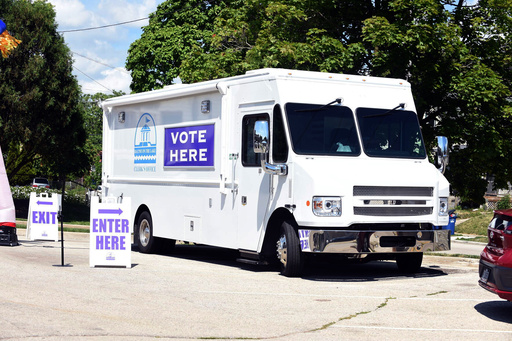MADISON, Wis. — The Wisconsin Supreme Court came to a divided decision on Tuesday, determining that a Republican Party official did not possess the necessary standing to initiate a lawsuit contesting the use of a mobile voting van used in the 2022 elections. The legal challenge sought to prohibit mobile voting vans in any forthcoming elections within this pivotal state.
Although the court did not assess the legality of mobile voting sites in its ruling, the decision implies that such vans may be used in future electoral processes. The only instance of this van’s use occurred in Racine during a primary in 2022, allowing for absentee ballots to be cast over a fortnight prior to the election. Officials from Racine, alongside members of the Democratic National Committee and other supporters, argue that state laws do not explicitly ban these voting vans. Following the court’s ruling, Racine’s officials expressed intentions to deploy the van again during upcoming elections in April, emphasizing its significance in aiding voter access to the polls.
In a narrow 4-3 decision, the court dismissed the case without deliberating on its substantive issues. The majority comprised four liberal justices, while the dissenting opinion was voiced by three conservative justices. The Supreme Court concluded that Ken Brown, the Racine County Republican Party chairman who filed the lawsuit, did not qualify as “aggrieved” under existing state laws and, consequently, lacked the authority to pursue legal action.
Justice Rebecca Bradley, who dissented, voiced concerns that the ruling permits the elections commission’s decision to evade judicial scrutiny, leaving voters without clarity on critical election law matters that protect their essential voting rights. She highlighted that the ruling complicates the ability for voters to challenge perceived violations of election law.
According to Bradley, the majority’s decision effectively distorts the law to suit its own preferences, essentially closing off avenues for voters to seek recourse in court. The conservative law firm, Wisconsin Institute for Law and Liberty, represented Brown in this case. Its deputy counsel, Lucas Vebber, criticized the ruling, asserting that it undermines the ability of Wisconsin residents to hold their elected officials accountable.
Conversely, Democratic Attorney General Josh Kaul commended the ruling, interpreting it as a safeguard for in-person absentee voting, which will remain broadly accessible and unencumbered. The Republican perspective contends that mobile voting sites infringe upon state law by raising the potential for voter fraud, claiming that the van served to enhance turnout for Democratic voters.
State law prohibits establishing early voting locations that might advantage any political party and has stringent regulations regarding early voting sites, including requirements that they be situated near the clerk’s office. For the 2022 elections, Racine City Clerk Tara McMenamin aimed to maximize voter accessibility in the process.
The mobile voting van was acquired with funds from a grant provided by the Center for Tech and Civic Life, a nonprofit organization financially backed by Facebook CEO Mark Zuckerberg and his spouse. Republicans have often criticized such grants, dubbing the funds “Zuckerbucks” and alleging misuse to influence turnout in favor of Democratic strongholds. Last year, Wisconsin voters endorsed a Republican-sponsored constitutional amendment that prohibits the utilization of private funds to facilitate election management.
During the 2022 election cycle, the van exclusively supported early in-person voting over a two-week duration, moving across twenty-one different locations in Racine, as reported by McMenamin. The day after the August primary in 2022, Brown lodged a complaint with the Wisconsin Elections Commission, asserting that the van was in violation of state law because it predominantly operated in areas favoring Democratic voters, thereby unfairly enhancing turnout.
McMenamin contested these claims, indicating they stemmed from a lack of understanding of the city’s voting districts, which have historically shown Democratic leanings. When the elections commission dismissed the complaint just days before the election, reasoning that there was no substantial evidence of legal violations, Brown proceeded to file a lawsuit.
A judge from Racine County Circuit Court ruled in favor of Republicans, asserting that state laws did not permit the operation of mobile voting sites. In appealing the decision, the elections commission argued that Brown lacked the legal standing required to challenge the commission’s ruling in court. Although state law allows individuals who are “aggrieved” by a commission order to seek judicial review, the state Supreme Court concluded that Brown did not adequately demonstrate how he had been adversely affected by the commission’s resolution.
